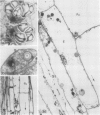Abstract
Gravitropism in dark-grown hypocotyls of the wild type was compared with a starch-deficient Nicotiana sylvestris mutant (NS 458) to test the effects of starch deficiency on gravity sensing. In a time course of curvature measured using infrared video, the response of the mutant was greatly reduced compared to the wild type; 72 hours after reorientation, curvature was about 10° for NS 458 and about 70° for wild type. In dishes maintained in a vertical orientation, wild-type hypocotyls were predominantly vertical, whereas NS 458 hypocotyls were severely disoriented with about 5 times more orientational variability than wild type. Since the growth rates were equal for both genotypes and phototropic curvature was only slightly inhibited in NS 458, the mutation probably affects gravity perception rather than differential growth. Our data suggest that starch deficiency reduces gravitropic sensitivity more in dark-grown hypocotyls than in dark- or light-grown roots in this mutant and support the hypothesis that amyloplasts function as statoliths in shoots as well as roots.
Full text
PDF






Images in this article
Selected References
These references are in PubMed. This may not be the complete list of references from this article.
- Caspar T., Pickard B. G. Gravitropism in a starchless mutant of Arabidopsis: implications for the starch-statolith theory of gravity sensing. Planta. 1989;177:185–197. [PubMed] [Google Scholar]
- Hanson K. R., McHale N. A. A Starchless Mutant of Nicotiana sylvestris Containing a Modified Plastid Phosphoglucomutase. Plant Physiol. 1988 Nov;88(3):838–844. doi: 10.1104/pp.88.3.838. [DOI] [PMC free article] [PubMed] [Google Scholar]
- Kiss J. Z., Hertel R., Sack F. D. Amyloplasts are necessary for full gravitropic sensitivity in roots of Arabidopsis thaliana. Planta. 1989;177:198–206. [PubMed] [Google Scholar]
- Kiss J. Z., Sack F. D. Reduced gravitropic sensitivity in roots of a starch-deficient mutant of Nicotiana sylvestris. Planta. 1989;180:123–130. [PubMed] [Google Scholar]
- Sack F. D., Kiss J. Z. Rootcap structure in wild type and in a starchless mutant of Arabidopsis. Am J Bot. 1989;76(3):454–464. [PubMed] [Google Scholar]
- Sack F. D. The structure of the stem endodermis in etiolated pea seedlings. Can J Bot. 1987;65(7):1514–1519. doi: 10.1139/b87-209. [DOI] [PubMed] [Google Scholar]
- Song I., Lu C. R., Brock T. G., Kaufman P. B. Do starch statoliths act as the gravisensors in cereal grass pulvini? Plant Physiol. 1988;86:1155–1162. doi: 10.1104/pp.86.4.1155. [DOI] [PMC free article] [PubMed] [Google Scholar]





